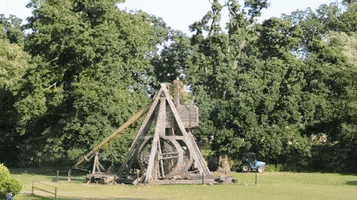Europe, Boring Until it's Not
-
Speaker to Animals

- Posts: 38685
- Joined: Wed Nov 30, 2016 5:59 pm
Re: Europe Boring Until it's Not
I don't understand the custom. When did that begin? You'd think the monarchs not even a hundred years ago would have somebody publicly flogged for disrespecting the throne.
Is this something that came about ever since the Civil Wars?
Is this something that came about ever since the Civil Wars?
-
Montegriffo

- Posts: 18718
- Joined: Wed Nov 30, 2016 7:14 am
Re: Europe Boring Until it's Not
Black rod is the spokesman for the house of Lords( edit, the Monarchy) therefore ''disrespected'' in the house of commons. That's why they slam the door in his face as he tries to enter and he has to bang on the door to be let in. Not sure how far it goes back, could be all the way back to the civil war as you say.Speaker to Animals wrote:I don't understand the custom. When did that begin? You'd think the monarchs not even a hundred years ago would have somebody publicly flogged for disrespecting the throne.
Is this something that came about ever since the Civil Wars?
Last edited by Montegriffo on Wed Jun 21, 2017 3:15 pm, edited 1 time in total.
For legal reasons, we are not threatening to destroy U.S. government property with our glorious medieval siege engine. But if we wanted to, we could. But we won’t. But we could.


-
Montegriffo

- Posts: 18718
- Joined: Wed Nov 30, 2016 7:14 am
Re: Europe Boring Until it's Not
Basically he's a posh doorman https://www.parliament.uk/get-involved/ ... k-to-1348/
The history of the ‘black rod’ starts in 1348 when Edward III had completed a very successful campaign in France. I'll choose my words carefully: are there any French people here? Well, he beat the French at the Battles of Crecy and Calais and this re-established the English territories in France and the English Sovereign rule over those territories.
When Edward III came back to England he wanted to reward the 25 people who had been his particular supporters in prosecuting this campaign. Not just the military commanders who commanded the troops in the campaign and helped him win the battles but also those who’d supported him in terms of developing the strategy, the campaign; resourcing the campaign, enabling and facilitating the campaign, raising the money back home to fund the campaign and of course keeping the peace and keeping order back in England whilst the King and his army was abroad.
And these 25 top chaps - he made them knights in the Order of the Garter. The Order of the Garter still exists today. There are still only 25 knights in the Order of the Garter and a new knight is only invested into the Order of the Garter on the death of an existing knight.
These 25 knights who Edward III appointed used to meet together with the Sovereign in a castle or a palace - very often Windsor Castle – and do so even today, jumping from 1348 and the 16th Century to today's role to establish these linkages and the historical legacy which explains to a certain extent the current role of Black Rod.
The Order of the Garter still meets with the Sovereign - generally only once a year - usually the second or third Monday in June.
Going back to 1348, what Edward did with these 25 knights was he had them in and he would have meetings with them - consultations, discussions - they were in a way his advisory council.
At these meetings they would do three things - they would have the meetings themselves and then they would process. Don't forget this was the Sovereign with his 25 top knights in the land - and so the processions were a public spectacle. So the Sovereign and his knights would dress in their finest robes, process from the meeting room to the local cathedral, chapel or church for divine service, and then they would process from the cathedral or chapel to a hall for feasting, banqueting.
These meetings would go on for a day or maybe several days.
Today the Queen still summons the Knights of the Garter on the second or third Monday of June and she has them to an extremely good lunch (I attended!) in Windsor Castle. The knights then dress in those great robes and the rather daft hats with white feathers and process with the Queen and with the royal knights - there are 25 temporal knights and as many royal knights as the Queen will appoint and they process to St George's Chapel and have divine service and then they process back afterwards.
So you could say not much has changed - I'll come back to that turn of phrase in just a moment.
Because, in 1348, there wasn't a police force as we would recognise the police these days. In fact there wasn't a G4S either. And yet there were at that time – to use the common word - miscreants and delinquents: troublemakers. And the meetings which the Sovereign held with the Knights of the Garter were sometimes disrupted by people who wanted to get into the meetings who weren't allowed in, or sometimes people who were in the meetings, advising or consulting, who were invited into the meetings but who needed to be ejected for whatever reason.
And also the processions needed ordering - the ceremonial of the King and the knights and their fine robes. So the King appointed what was known then as an ussarius.
Ussarius is the mediaeval Latin for 'doorkeeper' and essentially what this doorkeeper did was he was responsible for access and order and discipline.
Now the modern derivation of that word - ustiarius - is 'usher'. And this usher, because he was dealing with the 25 top knights of the land needed to be someone who was respected by those knights. So he had to be a Gentleman. So he was known - and is known - as the Gentleman Usher.
But in order that both the knights and members of the public recognised him as having authority the King gave the Gentleman Usher the black rod.
Not this one being passed round - as I say, this one dates from 1873.
It was a tradition of Black Rods’ that when they left their job they generally took their rods with them but that stopped in 1873. You can see here in Parliament we've been suffering austerity measures for a long time.
The key thing about the black rod is not the rod itself or the blackness of it - in fact the key thing is if you look on the top of it there is a gold lion and the lion is the significant part of the rod because the lion is the symbol of royalty and it indicates the Sovereign's authority.
So the Gentleman Usher carrying the black rod with its royal lion is a symbol of the Sovereign's authority.
For legal reasons, we are not threatening to destroy U.S. government property with our glorious medieval siege engine. But if we wanted to, we could. But we won’t. But we could.


-
BjornP

- Posts: 3360
- Joined: Thu Dec 01, 2016 9:36 am
- Location: Aalborg, Denmark
Re: Europe Boring Until it's Not
A hundred years ago most Western and Northern European monarchs were already democratic constitutional monarchies, so it'd be wrong to think that. You might get fined for disrespecting the monarchy, though what was particularly disrespectful of the British monarchy in that video I don't know.Speaker to Animals wrote:You'd think the monarchs not even a hundred years ago would have somebody publicly flogged for disrespecting the throne.
Is this something that came about ever since the Civil Wars?
Britain has been a constitional monarchy for most of its history. It would natural to assume that it would develop over the span of centuries of const-monarchy, a highly ritualized relationship between monarch, parliament and the governed. A relationship that needed to stress to any monarch, that they must not attempt to seize too much power for themselves (absolute monarchy) and that their place on the throne relied on the consent of parliament.
Fame is not flattery. Respect is not agreement.
-
Montegriffo

- Posts: 18718
- Joined: Wed Nov 30, 2016 7:14 am
Re: Europe Boring Until it's Not
Ah, here we go, https://en.wikipedia.org/wiki/Black_Rod ... Parliament
Black Rod is best known for his part in the ceremonies surrounding the State Opening of Parliament and the Throne speech. He summons the Commons to attend the speech and leads them to the Lords. As part of the ritual, as Black Rod approaches the doors to the chamber of the House of Commons to make his summons, they are slammed in his face. This is to symbolize the Commons' independence of the Sovereign. Black Rod then strikes the door three times with his staff, and is then admitted and issues the summons of the monarch to attend.[2]
This ritual is derived from the attempt by King Charles I to arrest the Five Members in 1642, in what was seen as a breach of the constitution. This and prior actions of the King led to the Civil War. After that incident, the House of Commons has maintained its right to question the right of the monarch's representative to enter their chamber, although they cannot bar them from entering with lawful authority.
For legal reasons, we are not threatening to destroy U.S. government property with our glorious medieval siege engine. But if we wanted to, we could. But we won’t. But we could.


-
Speaker to Animals

- Posts: 38685
- Joined: Wed Nov 30, 2016 5:59 pm
Re: Europe Boring Until it's Not
BjornP wrote:A hundred years ago most Western and Northern European monarchs were already democratic constitutional monarchies, so it'd be wrong to think that. You might get fined for disrespecting the monarchy, though what was particularly disrespectful of the British monarchy in that video I don't know.Speaker to Animals wrote:You'd think the monarchs not even a hundred years ago would have somebody publicly flogged for disrespecting the throne.
Is this something that came about ever since the Civil Wars?
Britain has been a constitional monarchy for most of its history. It would natural to assume that it would develop over the span of centuries of const-monarchy, a highly ritualized relationship between monarch, parliament and the governed. A relationship that needed to stress to any monarch, that they must not attempt to seize too much power for themselves (absolute monarchy) and that their place on the throne relied on the consent of parliament.
The crime was called Lèse-majesté, and punishment in England prior to the Civil Wars was death.
You often forget that, up until 16th century, the history of England was our history too.
-
Speaker to Animals

- Posts: 38685
- Joined: Wed Nov 30, 2016 5:59 pm
Re: Europe Boring Until it's Not
Montegriffo wrote:Ah, here we go, https://en.wikipedia.org/wiki/Black_Rod ... ParliamentBlack Rod is best known for his part in the ceremonies surrounding the State Opening of Parliament and the Throne speech. He summons the Commons to attend the speech and leads them to the Lords. As part of the ritual, as Black Rod approaches the doors to the chamber of the House of Commons to make his summons, they are slammed in his face. This is to symbolize the Commons' independence of the Sovereign. Black Rod then strikes the door three times with his staff, and is then admitted and issues the summons of the monarch to attend.[2]
This ritual is derived from the attempt by King Charles I to arrest the Five Members in 1642, in what was seen as a breach of the constitution. This and prior actions of the King led to the Civil War. After that incident, the House of Commons has maintained its right to question the right of the monarch's representative to enter their chamber, although they cannot bar them from entering with lawful authority.
So it does go back the Civil Wars. That's interesting how that conflict still leaves its mark.
-
Montegriffo

- Posts: 18718
- Joined: Wed Nov 30, 2016 7:14 am
Re: Europe Boring Until it's Not
Seven weird things you didn't know about the Houses of Parliament
1. It has its own snuff box
The Commons has its own snuff box (as every house should have). Supposedly a medicinal pick-me-up for members no longer able to smoke in the building, the powdered tobacco is kept in a special box crafted from old timbers reclaimed from the ravages of the fire that destroyed the original building. It is held by the entrance to the chamber, though the number of participants is believed to have dwindled to zero.
2. It's equipped to stop sword fights
Red lines on the floor of the chamber of the House of Commons, one ahead of each side of the front bench, are supposedly greater than two sword lengths apart so that no opposing members become embroiled in a duel mid-debate.
3. But where do they keep their swords?
On the special purple ribbon loops by the coat hangers in the members’ cloakroom, of course.
4. What about rifles?
For when the proverbial really hits the fan, swords just don’t cut it (don't bring a knife to a gunfight). Which is perhaps why there remains a rifle range deep in the bowels of the House of Parliament. The 25-yard range was founded in 1915 with the aim of “promoting a stronger sense of citizenship among members”, but is now not long for this world. In recent years, a nursery and a swimming pool have each been mooted as replacement uses for the range.
5. It boasts surprising art
What better way to commemorate our greatest statesman than to hang some of his hobby art on the walls in the House of Commons. 'Coast scene near Cannes' (1935) by Sir Winston Churchill is on display in the No division lobby adjacent to the chamber. Presumably painted during his “wilderness” years.
6. And uses paper made of dead goats
Last year parliament came within a whisker of the end of its tradition of printing its decisions on treated calf-skin, or vellum. After plenty of um-ing and ah-ing about the cost of the practice, it was decided it was worth paying £80,000 not to switch to bog-standard paper.
7. It has a famous cupboard
The Houses of Parliament, steeped in history as it is and proud of it, is the place to be if you’re a fan of plaques. Nelson Mandela was here plaques, Charles I sentenced to death plaques, but also one commemorating Emily Davison and the cupboard she hid in during the night of the 1911 census. By doing so, she was able to record her address as “the House of Commons”, thus making her claim to the same political rights of men. Of further interest was that the plaque was put up by Tony Benn MP, of his own volition. "I have put up several plaques—quite illegally, without permission; I screwed them up myself," he said. You shouldn't try that.
For legal reasons, we are not threatening to destroy U.S. government property with our glorious medieval siege engine. But if we wanted to, we could. But we won’t. But we could.


-
BjornP

- Posts: 3360
- Joined: Thu Dec 01, 2016 9:36 am
- Location: Aalborg, Denmark
Re: Europe Boring Until it's Not
I know. Not sure why you'd say I "forgot" that if I did not say anything indicating I did. I never claimed that American history wasn't also English/early British history, nor that your ancestors couldn't get killed for insulting the majesties back before the Enlightenment (gradually) brought new ideals about individual freedoms to Europe. First part of my post was a minor correction to what you posted at first (see above quote), and the second was a piece of speculation about why the British parliament had these rituals of theirs.Speaker to Animals wrote:BjornP wrote:A hundred years ago most Western and Northern European monarchs were already democratic constitutional monarchies, so it'd be wrong to think that. You might get fined for disrespecting the monarchy, though what was particularly disrespectful of the British monarchy in that video I don't know.Speaker to Animals wrote:You'd think the monarchs not even a hundred years ago would have somebody publicly flogged for disrespecting the throne.
Is this something that came about ever since the Civil Wars?
Britain has been a constitional monarchy for most of its history. It would natural to assume that it would develop over the span of centuries of const-monarchy, a highly ritualized relationship between monarch, parliament and the governed. A relationship that needed to stress to any monarch, that they must not attempt to seize too much power for themselves (absolute monarchy) and that their place on the throne relied on the consent of parliament.
The crime was called Lèse-majesté, and punishment in England prior to the Civil Wars was death.
You often forget that, up until 16th century, the history of England was our history too.
Anyway. You did post something I didn't know, that the French (and English adopted) word for insulting a royal was lese-majesté. Thank you for that. A little extra for my mental English-Danish dictionary.
Fame is not flattery. Respect is not agreement.
-
TheReal_ND

- Posts: 26035
- Joined: Wed Nov 30, 2016 6:23 pm
Re: Europe Boring Until it's Not

AHAHAHAHAHAHAHAHAHhHa *breath* AHAHAHAHAHAHAHAHAHAHAHAHAHAHAHhhahH
